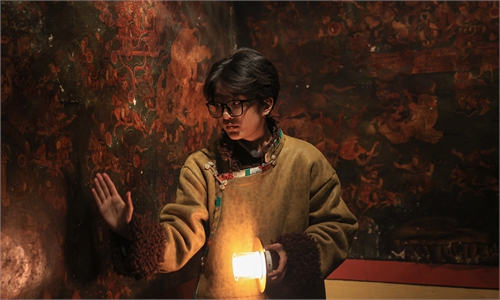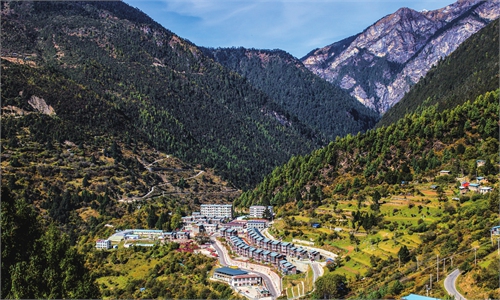IN-DEPTH / IN-DEPTH
Xizang in the New Era: Why are boarding schools embraced by residents in Xizang?
The optimal choice
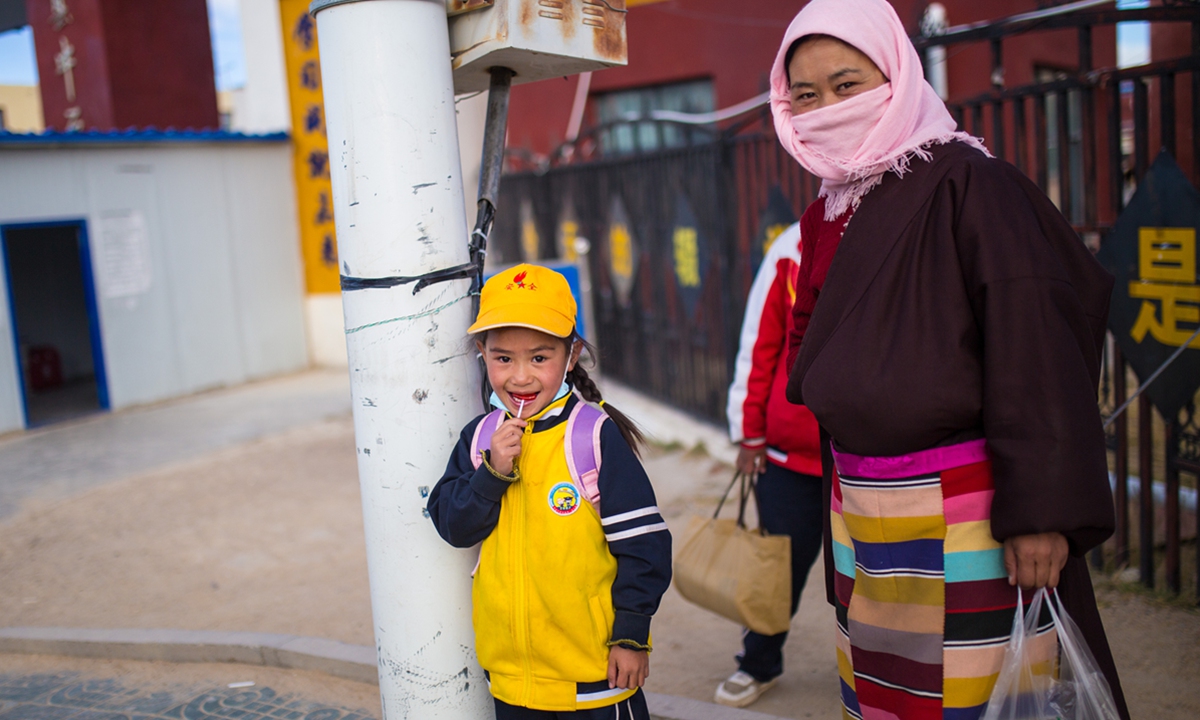
A student and her mother leave school after class in Baingoin county, Nagqu, Southwest China's Xizang Autonomous Region, on October 13, 2023.Photo: Shan Jie/GT
Majestic snow-capped mountains, vast grasslands, and deep gorges - the picturesque landscapes of Southwest China's Xizang Autonomous Region so admired by global tourists could otherwise pose barriers to local children's access to modern education.The mountainous terrain and scattered living patterns make commuting to school difficult for Xizang's students, and establishing nearby schools does not always offer a feasible solution. Consequently, boarding schools have emerged as the optimal choice. Nearly 40 years of practice has proved that boarding schools can provide equal access to quality education for students across the region.
During a recent visit to various areas in Xizang, Global Times reporters noted that atop the snow and frozen earth, boarding schools serve as a warm harbor for children, propelling them toward their dreams amid mountains and rivers.
Some parents told the Global Times that boarding schools provide care and opportunities for their children that they could not offer themselves. Moreover, the growth and occasional surprises their children experience at boarding schools are cherished.
A Tibetan scholar who attended boarding schools said that this is the most effective way for Tibetan children to succeed and see the world. For some children, it is the only way. The malicious smearing of Xizang's boarding education is a great injustice to these children.
Education for all
In Baingoin county, Nagqu, northern Xizang, situated at an altitude of 4,700 meters above sea level, a primary school built with support from state-owned company Sinopec has become a topic of conversation online in China. Dubbed the "school closest to the sky," it boasts standard sports fields, multimedia classrooms, and heated glass greenhouse-like dormitories despite its remoteness.
The modern educational complex, blending the traditional Tibetan aesthetic with contemporary architecture, stands out amid the desolate grasslands and barren mountains. From afar, it might even seem out of place, but it meets the educational and living needs of students from pastoral areas hundreds of kilometers around.
"Some of our students come from remote pastoral areas. Their parents are often busy with farming and work, making it impossible to regularly drop off and pick up their children from school. Boarding at school ensures the daily care of these children," Ngawang Wangdu, the principal of Sinopec Primary School, told the Global Times.
The school has enrolled over 1,300 students. Lower grade students mostly commute from the county town of Baingoin, while students from grades three to six, mostly from different areas of the county, choose to board.
"Lower grade students have limited ability to live independently, so we do not recommend boarding for them. However, we provide boarding facilities for some parents who find it difficult to care for their children, as the school provides better living and learning conditions," explained Ngawang.
In sparsely populated Baingoin county, the school is a hive of laughter and joy. The combination of modern education and traditional Tibetan culture enriches the students' campus life.
Inside the school, students play basketball together and physical education teachers lead them in local ethnic dances. Inside the teaching buildings, the sounds of children learning different languages including Putonghua (standard Mandarin), Tibetan, and English intermingle.
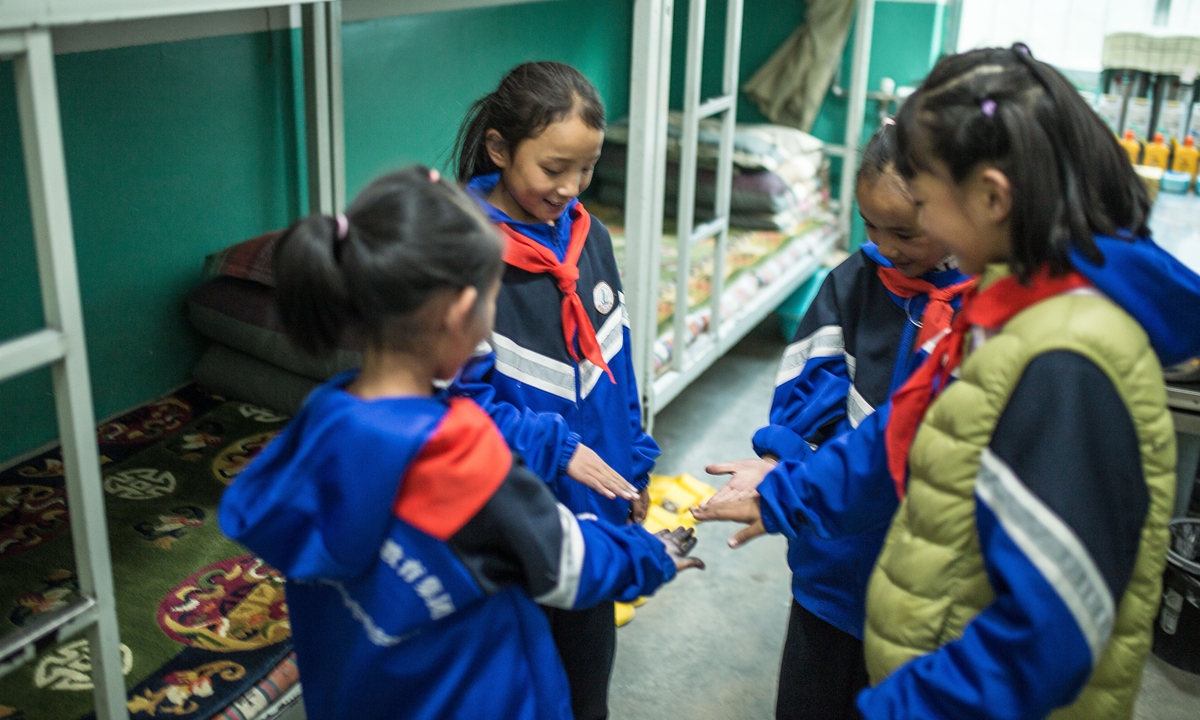
Children play in a dormitory in Sinopec Primary School in Baingoin county, Nagqu, Southwest China's Xizang Autonomous Region, on October 13, 2023.Photo: Shan Jie/GT
Padma Gyaltsen, a fourth-grade student at the school, comes from a pastoral family living about 100 kilometers from the county. Usually, it takes him over two hours by car to travel from Baingoin town to his home. Padma told the Global Times that to ensure he received the best education, his parents previously rented a house in the county, where his aunt took care of him. Now, having chosen to board, he has since adapted to boarding life thanks to the attentive care of teachers and the friendly help of classmates."I think the living conditions at school are very good, especially the meals in the cafeteria. Teachers help us with any difficulties in daily life, and all my classmates are my friends," he said.
Mimi, a female student at the Second High School in Shannan city, Xizang, has a similar story. She was sent from Sog county in Nagqu to Shannan in search of better education.
"My home is 700 kilometers away. The round trip from my home to school is over 1,400 kilometers. It is impossible for me to go back home after finishing school," she told the Global Times.
"Boarding saves time and travel expenses and reduces the burden on my family. This winter, the school has not only provided us with winter uniforms but also added a vest, making me feel warmer. I have not faced any challenges in boarding life," Mimi said.
The stories of Padma and Mimi are representative of many students in Xizang. Global Times reporters witnessed in various boarding schools across the region that many children from remote pastoral areas are not deprived of modern education or opportunities for success due to their distance from towns or natural barriers. Various supportive educational policies ensure that children across Xizang can grow and thrive in school settings.
Since 1985, the Xizang Autonomous Region has implemented the "Three Guarantees" policy within boarding schools, covering food, accommodation, and school expenses, while also actively involving students' families in school management and planning through parent committees and open days.
In 2012, Xizang pioneered a 15-year public education policy system in China and established a student aid policy system.
Since then, Xizang has increased funding standards eight-fold. The current average annual funding standard per student under the "Three Guarantees" policy is 4,200 yuan ($576), with a cumulative investment of 22.067 billion yuan, benefiting more than 6.55 million students. Additionally, there are 40 student aid policies in Xizang, ensuring support for all eligible students and guaranteeing equal education for every child. The illiteracy rate among young and middle-aged people in Xizang has dropped to about 0.5 percent, according to the newly released white paper - CPC Policies on the Governance of Xizang in the New Era: Approach and Achievements.
Decision of parents
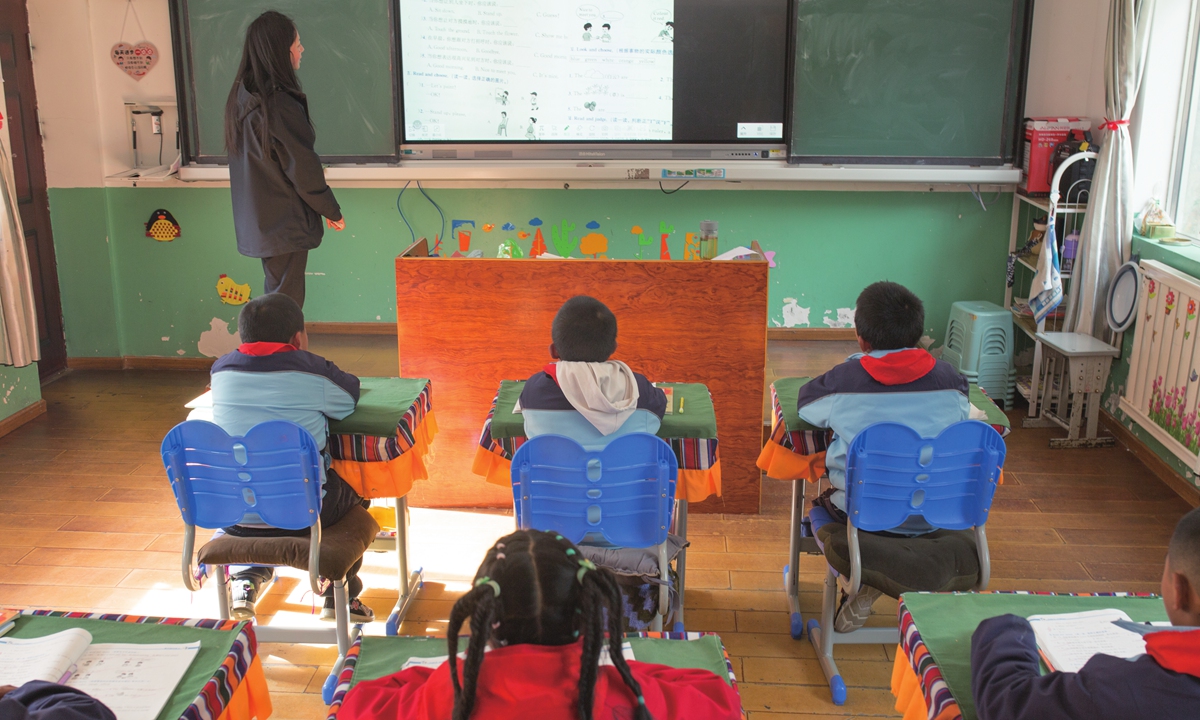
Students attend an English lesson in a primary school in Mama Monpa Ethnic township, Cona city, Southwest China's Xizang Autonomous Region, on October 23, 2023. Photo: Shan Jie/GT
Comprehensive support policies and superior campus environments have resolved concerns about children having to board, and ultimately, the decision to let children live collectively away from home rests with the parents.In conversations with Global Times reporters, many parents expressed their belief that boarding was the best decision for their children to aid in their success. The warm collective life at school also contributes to their growth.
Every Friday afternoon, Sonam Gyatso from Jomda county, Qamdo city, would arrive early at the gate of the First Middle School in Lhasa to wait for his daughter. A few years ago, Sonam made a difficult but unregretful decision: To give up his pastoral life and move his family to Lhasa, opening a supermarket to support his daughter's education.
In 2022, his daughter Gasong Cuojia graduated to the ninth grade. Like most parents with high aspirations for their children, Sonam unhesitatingly chose to have her board at school.
"Our home is far from the school, and ninth-grade students face pressure from the high school entrance exam. Boarding saves her the travel time home in the evenings, allowing her an extra study session, and it is safer. Boarding allows her to devote more time and energy to her studies. It also makes her more independent. We are quite reassured regarding her boarding life," said Sonam Gyatso.
Sonam Yangjen, who lives in Mama town, Cona city in Shannan Prefecture, southern Xizang, also deeply appreciates the benefits of boarding schools. The mother of two shared with the Global Times that in Shannan's mountainous and canyon-filled region, the long and rugged journey to school is unsafe for daily commutes. When the school offered a boarding option, she decisively sent her children to live and study at school.
"I think the boarding system is excellent. From a young age, children learn to make their beds and health routines. Back when they were living at home, we constantly had to remind them to tidy their rooms," said Sonam Yangjen.
Parents interviewed by the Global Times also had high praise for the education their children received at school.
Migmar Drolma, parent to a student at the Second High School in Shannan, shared with the Global Times that locals have always placed a high value on education, and neighbors are eager to send their children to good schools for a solid foundation. "Having my child go to school will shape his excellent character and contribute to his all-around development," Drolma said.
Sonam Gyatso's wife, Drolma Bazong, said that because they were not fluent in Putonghua, they often faced communication difficulties when purchasing goods for their supermarket. Their daughter Gasong Cuojia's trilingual education in Tibetan, Putonghua, and English played a crucial role in overall improvement of quality of life. "She often helps us communicate with various customers, acting as a translator and helps us resolve challenges. This makes me very proud," said Drolma Bazong.
For Sonam Yangjen, the advantage of boarding schools lies in concentrating superior educational resources to provide children with the most comprehensive education possible. "My two children study Tibetan, Putonghua, and Menba at school. Starting in the third grade, they also begin learning English. These courses are very important for their future development," said Sonam Yangjen.
She further expressed that the "Three Guarantees" policy now implemented throughout the Xizang region greatly benefits the children from herding and farming families.
"Once the children go to university, they can choose majors such as education, animal husbandry, veterinary medicine, agriculture, and forestry tuition free. Schools even provide students with supplemental nutrition in the form of bread and milk. The various subsidy policies of the country are excellent, making us feel that even though we live in remote border areas, our children and their education will not suffer," said Sonam Yangjen.
To ensure the robust growth of children from all regions of Xizang, the autonomous region has also implemented nutrition improvement pilot projects for students in compulsory education in farming and pastoral areas. The funding standard has been raised twice before, and the current annual stipend per student is 1,000 yuan, with a total investment of 3.252 billion yuan, benefiting 4.1766 million student-times.
Most effective way
Whether boarding schools are good or not is best judged by the residents in Xizang region.
Lajia Zhoudang, Deputy Dean of School of Marxism with the Sichuan Minzu College, and is also Tibetan, was benefited from boarding school system. In 2005, Lajia Zhoudang went from a boarding high school in Northwest China's Qinghai Province to Beijing, eventually earning a PhD in Political Science from prestigious Peking University.
As someone who experienced and benefited from boarding schools, Lajia Zhoudang believes that boarding schools are the most ideal and effective mode of education for students in the Xizang region under current conditions. In the first half of 2023, when the US and other Western countries smeared Xizang's boarding education system, Lajia, based on his personal experience and research, wrote an article titled "Boarding education in Xizang is the most scientific, effective, and beneficial," refuting disparaging claims.
"This article was widely circulated, and many of my Tibetan friends liked and shared it in their social circles, feeling that it spoke for the Tibetan people," Lajia told the Global Times.
In his view, some Western countries'allegations of "forced enrollment" and "assimilation education" in Xizang's boarding education system completely disregard the Tibetan people's ability to discern right from wrong, ignoring the fact that boarding education is the choice of the Tibetan people themselves.
According to Lajia's research, Xizang also tried other methods like local schooling before the reform and opening up, with nearly 6,000 teaching points in villages and towns across Xizang, at a ratio of almost"one school per village." However, due to the vast territory, sparse population, scattered villages, and inconvenient forms of transportation, each school had very few students and insufficient teaching staff, often with just one teacher handling all subjects. This resulted in consistently low education quality. At that time, the enrollment rate for middle school in Xizang was 6.5 percent, and 5.3 percent for high school, with a prominent dropout problem during the transition from primary to secondary education.
"The combination of day schooling and boarding education effectively solved the major problem of scarce and uneven education resources in Xizang. Currently, the gross enrollment rates for preschool, nine-year compulsory education, and high school education in Xizang are all above 85 percent," said Lajia Zhoudang.
Selective ignorance is actually undisguised discrimination and a deliberate catering to prejudice. Lajia Zhoudang believes that historically, Western boarding schools were a stain, with strong colonialist overtones and severe racism.
Therefore, when some Western countries transpose the "forced enrollment" and "cultural genocide" in their own boarding schools onto Xizang's education system, it generates discussion in the West, as many uninformed Westerners who have never been to Xizang and are unaware of its development achievements, continue to view China and the Xizang region through a biased lens, assuming that it is still backward and a frontier for human rights violations. This leads to the erroneous equating of Xizang's advanced boarding education system with the dark history of Western boarding schools, he stated.
However, boarding education in Xizang is actually a manifestation of high human rights standards. According to Lajia Zhoudang, boarding education in Xizang best exemplifies the principle of inclusivity. With the efforts of the central government and governments at all levels, various educational support policies have greatly compensated for the shortage of educational resources in Xizang, initiating the better allocation of national education resources across the region, allowing children from different family backgrounds to enjoy equal and high-quality education.
Therefore, the malicious attacks on Xizang's boarding education by some Western countries have been a source of profound indignation among Tibetan scholars like Lajia Dangzhou.

A view of Nagqu Prefecture, Southwest China's Xizang Autonomous Region Photo: Shan Jie/GT
"Countries like the US and Canada, which have actually implemented 'racial assimilation genocide' through coercive boarding education, have the least right to speak on this issue. Their current defamation of Xizang's boarding education only shows that they have not truly reflected on the dark history of their own boarding schools, and continue to stand on the opposite side of human rights," said Lajia Dangzhou."Based on my personal experience and observation, this is the most effective way for Tibetan children to succeed and see the world. For some children, it is the only way. The malicious smearing of Xizang's boarding education is a great injustice to these children," said Lajia Dangzhou.


